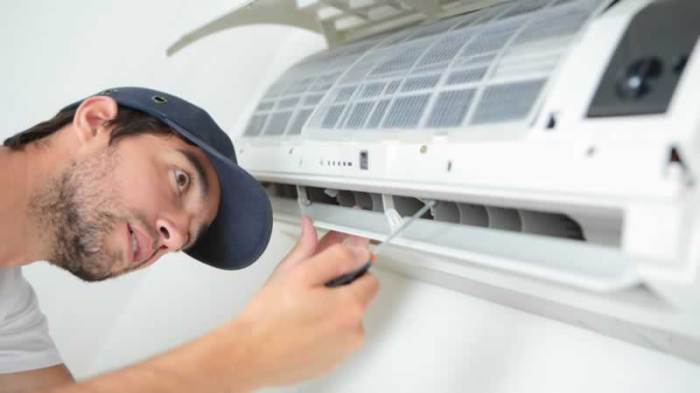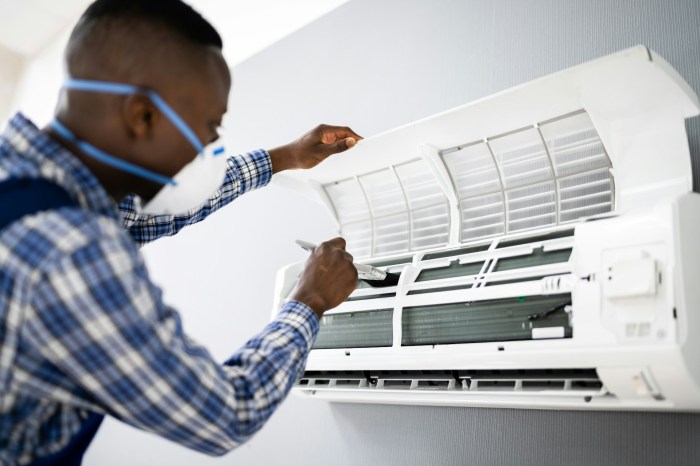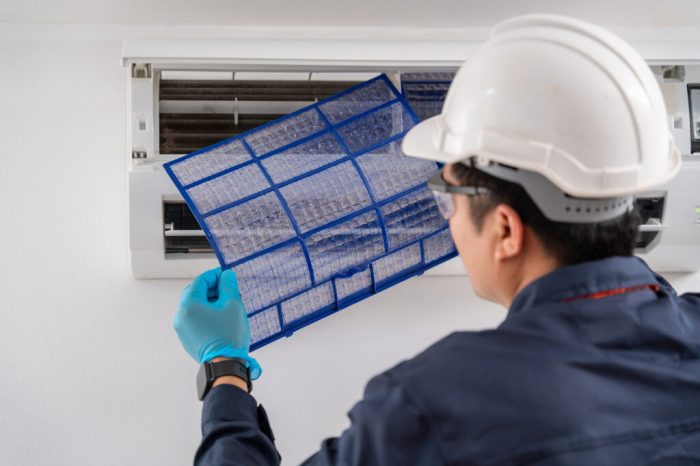The Importance of Regular AC Maintenance: A Comprehensive Guide
Regular AC maintenance is essential for the optimal functioning of air conditioning systems. By adhering to a consistent maintenance schedule, you can ensure that your unit operates efficiently, avoids costly repairs, and maintains a longer lifespan. Let's delve into the key aspects of regular AC maintenance to help you keep your system running smoothly.
In the following paragraphs, we will explore the components of regular AC maintenance, discuss the frequency of maintenance, compare the benefits of DIY versus professional maintenance, and highlight how maintenance can enhance the lifespan and efficiency of your AC unit.
Importance of Regular AC Maintenance

Regular maintenance for air conditioning systems is crucial to ensure optimal performance and longevity. By scheduling regular maintenance, you can prevent potential issues from arising and ensure that your AC unit operates efficiently. Neglecting AC maintenance can lead to various problems that can impact both the performance of the system and the comfort of your home.
Benefits of Regular Maintenance
- Improved Energy Efficiency: Regular maintenance helps keep your AC system running smoothly, reducing energy consumption and lowering utility bills.
- Extended Lifespan: Proper maintenance can extend the lifespan of your air conditioning unit, saving you money on costly replacements.
- Enhanced Air Quality: Routine maintenance includes cleaning and changing filters, which can improve indoor air quality by reducing dust, allergens, and pollutants in the air.
Potential Problems from Neglecting AC Maintenance
- Reduced Cooling Capacity: Dirty filters and coils can restrict airflow, reducing the cooling capacity of the AC system and making it harder to maintain a comfortable temperature.
- Increased Energy Costs: When the AC system is not properly maintained, it has to work harder to cool your home, leading to higher energy consumption and increased utility bills.
- Breakdowns and Repairs: Neglecting maintenance can result in unexpected breakdowns and costly repairs, disrupting your comfort and potentially leaving you without air conditioning during hot weather.
Components of Regular AC Maintenance

Regular AC maintenance involves several key components that are essential for keeping your air conditioning system running efficiently. One of the most important aspects of maintenance is cleaning filters and coils, as this can greatly impact the performance of your AC unit.
Checking refrigerant levels is also crucial, as low levels can lead to decreased cooling capacity and potential damage to the compressor.
Cleaning Filters and Coils
Regularly cleaning or replacing filters is vital to ensure proper airflow and efficiency of your AC system. Clogged filters can restrict airflow, causing the system to work harder and consume more energy. Dirty coils can also reduce the system's ability to cool the air efficiently.
By keeping filters and coils clean, you can improve the overall performance of your AC unit and extend its lifespan.
Checking Refrigerant Levels
Monitoring and maintaining the correct refrigerant levels is essential for the optimal operation of your AC system. Low refrigerant levels can indicate a leak in the system, which can lead to inadequate cooling and potential damage to the compressor. By regularly checking and adjusting refrigerant levels, you can ensure that your AC unit is functioning at its best and prevent costly repairs in the future.
Frequency of AC Maintenance
Regular maintenance of your AC system is crucial to ensure its optimal performance and longevity. The frequency of maintenance depends on several factors, including how often the AC is used, the environment it operates in, and whether it is a residential or commercial unit.
Determining Maintenance Frequency
- Residential AC units typically require maintenance once a year, preferably before the start of the cooling season. This helps address any issues before they escalate and ensures efficient operation throughout the summer.
- For commercial AC units, maintenance may be needed more frequently due to heavier usage. It is recommended to have these systems serviced at least twice a year to prevent breakdowns and maintain a comfortable indoor environment.
- In areas with high humidity or pollution levels, more frequent maintenance may be necessary to keep the AC system running smoothly and prevent damage from environmental factors.
Differences Between Residential and Commercial Units
- Residential AC units are typically used less frequently than commercial units, so annual maintenance is often sufficient to keep them in good condition.
- Commercial AC units, on the other hand, are subjected to heavier loads and may require maintenance every six months to address wear and tear from continuous operation.
- Commercial units also tend to be more complex and have larger capacities, which can lead to more frequent maintenance needs to ensure optimal performance and energy efficiency.
DIY vs. Professional Maintenance
When it comes to maintaining your AC system, you may be wondering whether to tackle the tasks yourself or hire a professional service. Both options have their own set of benefits and considerations that you should take into account before making a decision.DIY maintenance can save you money as you won't have to pay for a professional service.
Simple tasks like changing air filters, cleaning vents, and removing debris around the outdoor unit can often be safely performed by homeowners. This can help improve the efficiency of your AC system and extend its lifespan.On the other hand, professional maintenance ensures that your AC system is thoroughly inspected and serviced by trained technicians.
They have the expertise and tools to identify any potential issues before they escalate into major problems. Professionals can also perform more complex tasks like checking refrigerant levels, inspecting electrical components, and calibrating thermostats.It's important to know when to call a professional for maintenance.
If you are not familiar with the inner workings of an AC system or if you encounter any issues that you are unsure how to address, it's best to leave it to the experts. Improper DIY maintenance can actually do more harm than good, leading to costly repairs or even premature AC system failure.
Tasks suitable for DIY Maintenance
- Changing air filters regularly
- Cleaning vents and ducts
- Removing debris around the outdoor unit
When to Call a Professional
- Checking refrigerant levels
- Inspecting electrical components
- Calibrating thermostats
Extended Lifespan and Efficiency

Regular maintenance of your AC unit plays a crucial role in extending its lifespan and improving its efficiency. By taking care of your system, you can ensure it operates smoothly for years to come, while also reducing energy consumption and saving money in the long run.
Extended Lifespan
Proper maintenance, such as cleaning or replacing filters, lubricating moving parts, and checking for any issues, can significantly increase the lifespan of your AC unit. When these tasks are neglected, the system has to work harder to cool your space, leading to wear and tear that can shorten its lifespan.
By staying on top of maintenance tasks, you can avoid premature breakdowns and costly repairs, ultimately extending the life of your AC unit.
Efficiency Improvement
Regular maintenance also contributes to the energy efficiency of your AC system. When filters are clean, coils are free of dirt and debris, and components are well lubricated, your AC unit can operate more efficiently. This means it can cool your space effectively without using excess energy, resulting in lower utility bills.
Additionally, a well-maintained system is less likely to experience malfunctions or breakdowns, further improving its efficiency and reducing the need for emergency repairs.
Cost Savings
Maintaining your AC system properly can lead to significant cost savings over time. By preventing major issues through regular maintenance, you can avoid expensive repairs or even the need for premature replacement of your unit. Additionally, a well-maintained system operates more efficiently, leading to lower energy bills.
Investing in routine maintenance can save you money in the long term and ensure your AC system continues to perform optimally for years to come.
End of Discussion
In conclusion, regular AC maintenance is not just a recommended practice but a crucial one to ensure your air conditioning system works at its best. By following a consistent maintenance routine, you can enjoy a comfortable indoor environment, lower energy bills, and prevent unexpected breakdowns.
Stay proactive in caring for your AC unit, and it will reward you with reliable performance for years to come.
Detailed FAQs
How often should I schedule AC maintenance?
It is recommended to have your AC system serviced at least once a year to ensure optimal performance.
Can I clean the filters and coils myself?
Yes, cleaning filters and coils is a task that homeowners can safely perform to maintain the efficiency of their AC unit.
What are the risks of improper DIY maintenance?
Improper DIY maintenance can lead to reduced efficiency, increased energy consumption, and even costly damages to the AC system.




